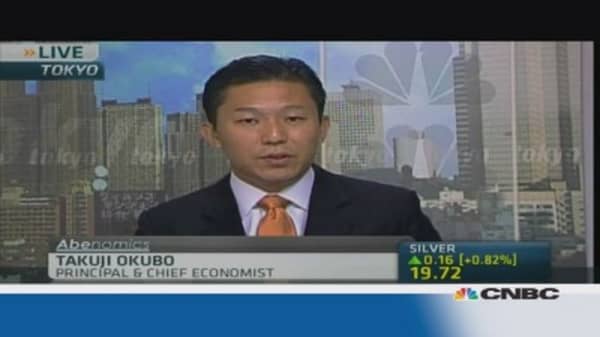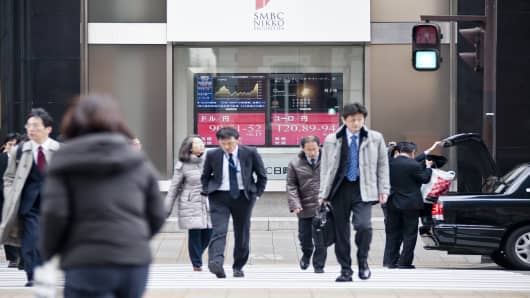The much-debated consumption tax hike, scheduled for April next year, is considered a vital step towards Japan getting its fiscal house in order, but one analyst told CNBC the measure is premature.
The current plan is for taxes to rise to 8 percent from 5 percent in April, and to 10 percent by October 2015, but recent reports have suggested Prime Minister Shinzo Abe is considering delaying the hike over fears of stalling the economic recovery. The government is expected to take a decision on this in late September to early October, Reuters reported on Thursday.
(Read More: Sales tax hike is vital and will hurt Japan, says IMF)
"A tax hike next year would put a stop to the positive cycle of Japan growing... so it's completely the wrong policy (at this time)," Takuji Okubo, principal and chief economist at Japan Macro Advisors told CNBC, adding that 2015 would be a better time to start raising the tax.
"I don't think raising consumption tax rate by 3 percent is going to help much, it's definitely not going to solve Japan's domestic problems. In order to have an ultimate resolve, Japan needs growth," he said.
After 15 years of deflation and low economic growth, recent data have shown signs of a pick-up in Japan's economy, giving credence to Prime Minister Shinzo Abe's ambitious plan to overhaul the economy, known as 'Abenomics.'
Japan's gross domestic product surged by an annualized 3.5 percent in the first quarter of this year, up from 1 percent in the previous quarter, while inflation data for June showed prices rose 0.4 percent year on year, its highest annual pace since November 2008.
Still, Abe has come under criticism for not pushing his structural reforms through quickly enough. The reforms are deemed necessary for the government to make headway in cutting the country's debt to GDP ratio of over 200 percent, and the consumption tax hike is seen by many industry watchers as an essential part of that plan.
On Thursday Bank of Japan governor Haruhiko Kuroda warned that a lack of progress on the consumption tax hikes and on fiscal reform in general could jeopardize the central bank's quantitative easing program.
(Read More: Could Japan fall back into recession next year?)





